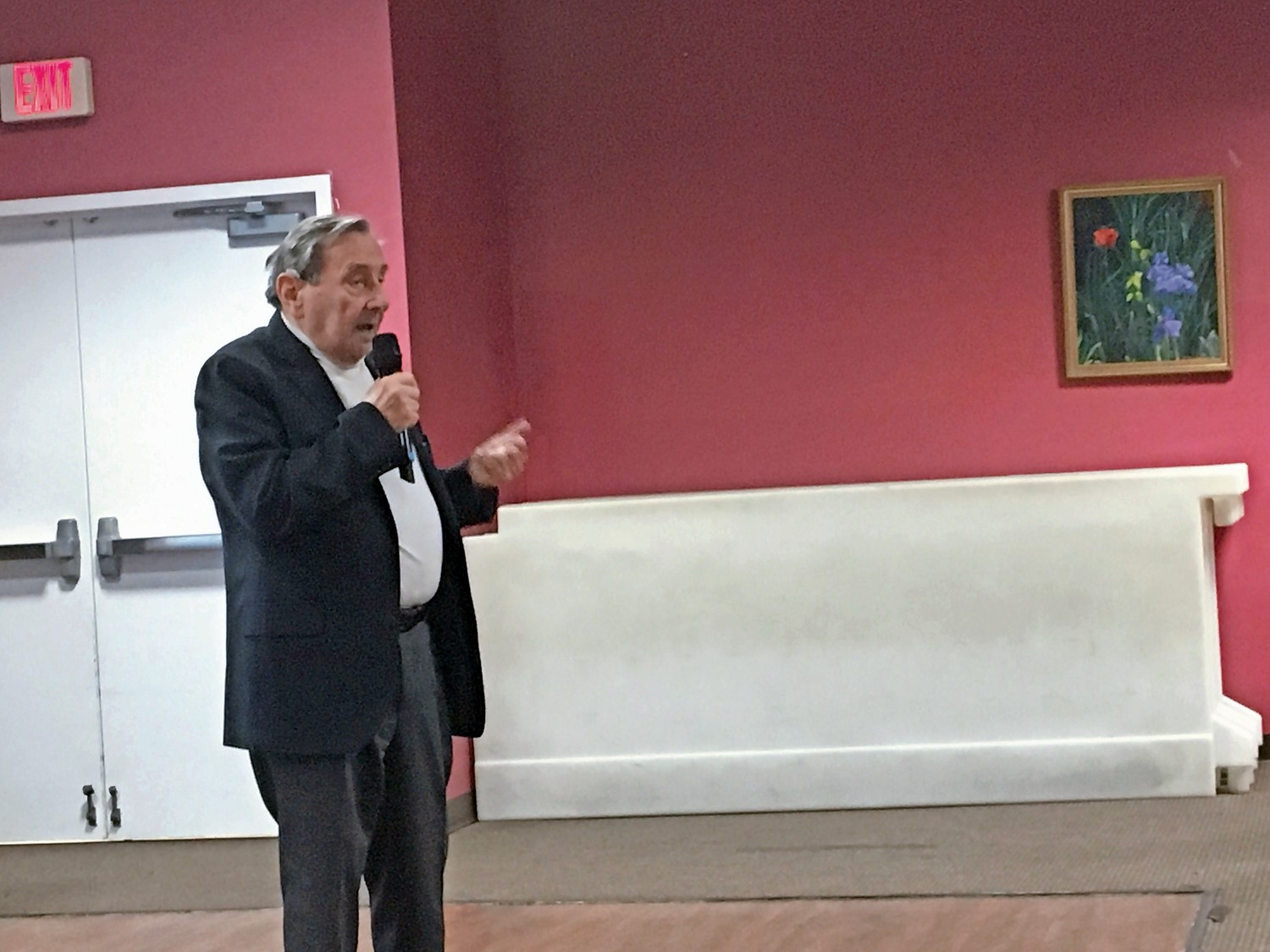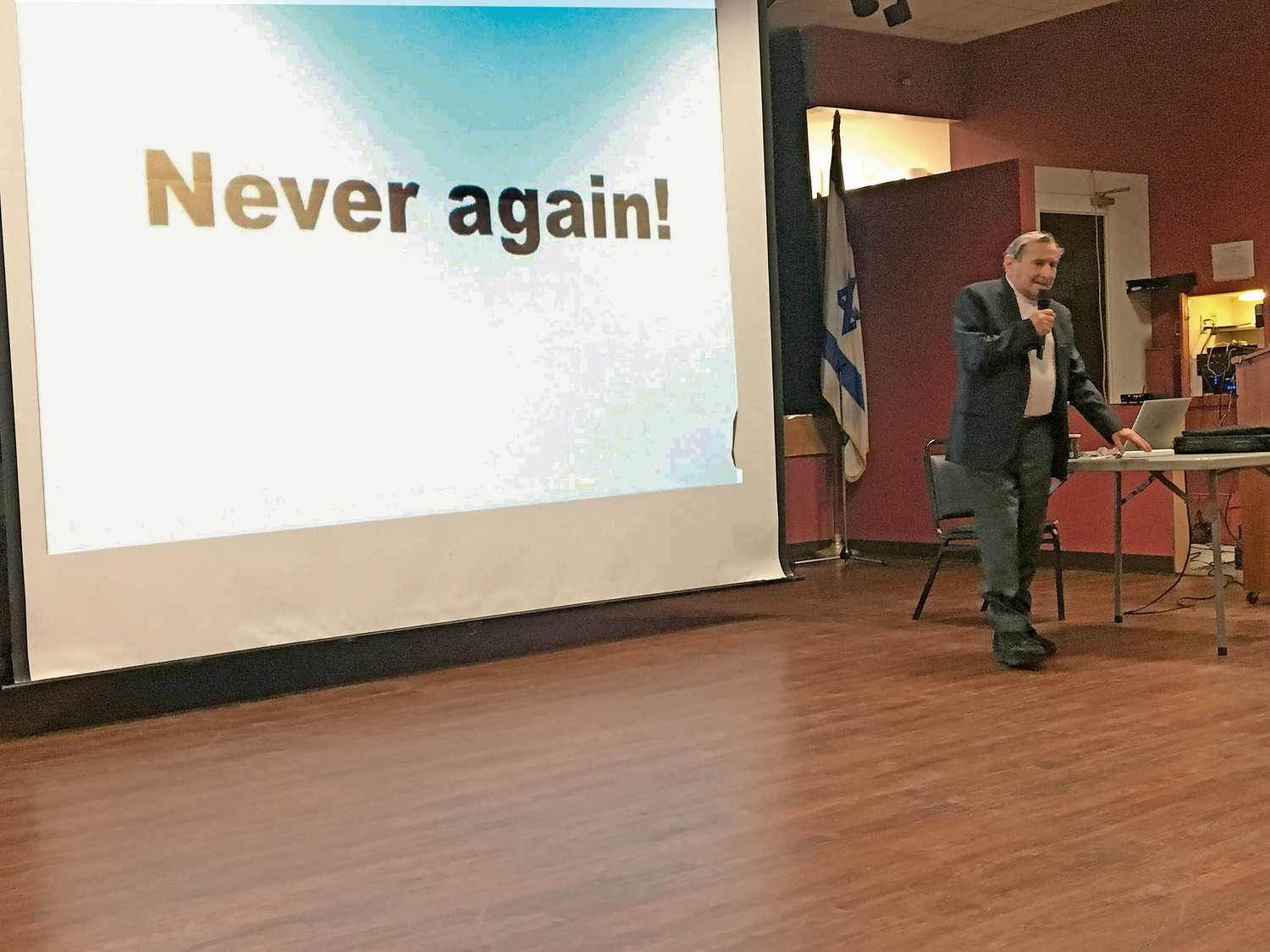Thursday, April 25, 2024
 47.0°,
Mostly Cloudy
47.0°,
Mostly Cloudy
Oceanside's Friedberg JCC commemorates Holocaust Remembrance Day
Survivor remembers, reflects during visit
The Holocaust was much bigger and lasted longer than society tends to recall, said Werner Reich, a 91-year-old survivor.
This was the Berlin-born man’s message on Jan. 24, when he spoke at the Friedberg Jewish Community Center. In observance of International Holocaust Remembrance Day on Sunday, the Jewish Community Council of Oceanside invited Reich to tell his story.
“This is very important to the JCC,” said Joni Center, the JCC’s executive director. “We are here forever, even if it’s just to talk about [the Holocaust]. As the survivors pass on, we will carry the torch.”
Reich has dedicated his life to sharing his experiences during the Holocaust, and has given his hour-long presentation across Long Island and around the world. He has spoken at schools and synagogues in Germany, Hong Kong, Portugal and England. At the JCC in Oceanside, he spoke to a group of about 30 community members, including rabbis from local synagogues.
Reich argued that Kristallnacht, when Nazis in Germany torched synagogues, vandalized Jewish homes, schools and businesses and killed nearly 100 Jews on Nov. 9 and 10, 1938, was not the start of the Holocaust, and that the liberation of the Auschwitz concentration camp in 1945 was not the end.
“So when did the Holocaust start, really?” he asked.
Reich pointed to the first six months of Adolf Hitler’s rule in Germany, which began on Jan. 30, 1933. Free speech was eliminated, buildings were ransakced and citizens were arrested without cause.
In one of several examples, he noted that on April 1, 1933, a national boycott of Jewish businesses and professionals took place. Protesters barred people from entering Jewish-owned businesses with signs that read, “Jews, defend yourselves” and “Don’t shop from Jews.” Additionally, anti-Semitic cartoons depicting Jewish people as greedy were distributed, Reich said, as he displayed one.
“About 300 Jews committed suicide that day — 300,” he said. “Could this count as the start of the Holocaust?” He said that he would not answer his own question; it was up to people to decide for themselves.
“I thought that was a really fascinating way to start,” said Sam Seifman, president of the JECOCO. “He put it into perspective and gave context of what the Nazi regime was all about.”
Reich continued by telling his own Holocaust story. “My Holocaust started five years before Kristallnacht,” he said. “My father lost his job, and my sister and I couldn’t go to school.”
He and his family left for Yugoslavia. After his father died of natural causes, Germany invaded Yugoslavia in 1941. Reich hid in the home of a couple who were part of the anti-Nazi resistance. After two years, the Nazis discovered Reich. The couple who helped conceal him were arrested, and Reich was beaten and imprisoned in a flea-infested cell. He was then transferred to a police station for six weeks. He was 15 years old. He never saw his mother again.
“I really didn’t know anything about concentration or extermination camps,” he said. “I was totally ignorant of that. The first time I realized what a concentration camp was, was when I was in one.”
Reich was placed in three different concentration camps. He described the suffering that he and millions of others endured in the camps using striking visuals. Reich displayed more than 20 images of muddy ground trod by death marchers, electrified barbed-wire fences on which some prisoners committed suicide, emaciated bodies piled in mass graves, and the three-tiered bunk beds that often collapsed and killed others below.
He noted that for many, the Holocaust dragged on even after liberation, when anti-Semites killed Jews in their hometowns. In addition to the 6 million Jews killed in the Holocaust, he recognized that 12 million people were killed overall, including Jewish and other civilians, people with disabilities, homosexuals, Jehovah Witnesses and criminals.
Seifman praised the level of detail and step-by-step storytelling of Reich’s presentation. “It was astounding,” he said. “You need someone to voice these memories, to remember and reflect.”
HELP SUPPORT LOCAL JOURNALISM
The worldwide pandemic has threatened many of the businesses you rely on every day, but don’t let it take away your source for local news. Now more than ever, we need your help to ensure nothing but the best in hyperlocal community journalism comes straight to you. Consider supporting the Herald with a small donation. It can be a one-time, or a monthly contribution, to help ensure we’re here through this crisis. To donate or for more information, click here.
Sponsored content
Other items that may interest you









